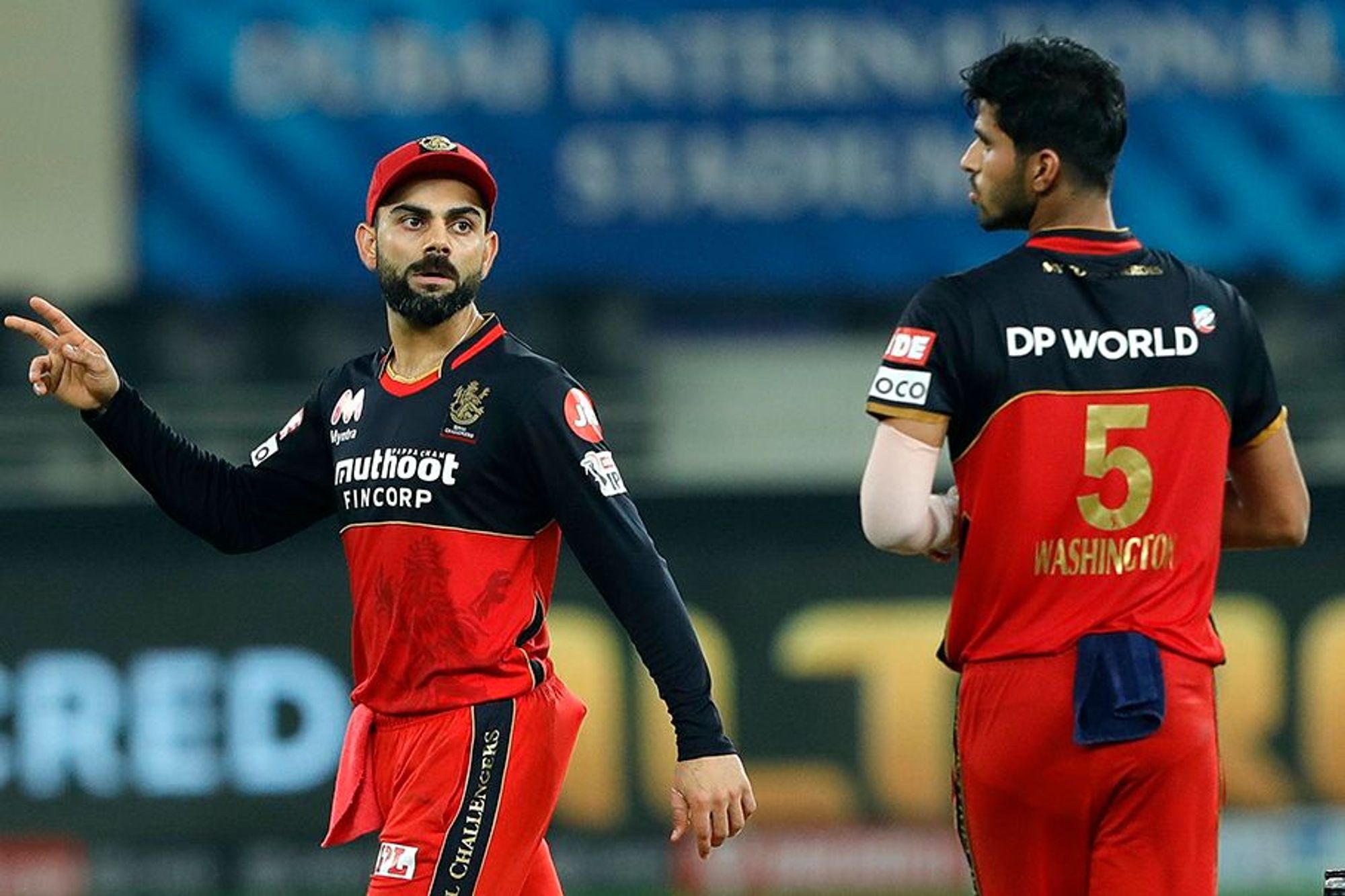It’s time we talk about Virat Kohli’s captaincy
104 needed off 36 balls, a short-boundary longer than Sharjah’s longest boundary and a rusty Kieron Pollard and a seemingly tired Ishan Kishan at the crease. Even by RCB’s comically low standards, a Mumbai comeback was beyond the fragment of imagination.

The madness that’d occurred 24 hours ago, particularly after both Rohit and Pandya holed out in the deep after getting clean connections, was equated to being a largely ‘Sharjah’ thing. Even the RCB fans, who are pessimists of the highest order and thrive on self-deprecation, at this point, were confident that they had the game in the bag, and the live match-thread on r/cricket was in unanimous agreement that Pollard & Co. were playing the NRR game.
36 balls and some 30 minutes later, though, RCB did the impossible. They conceded 9 sixes and 103 runs off the last six overs in the biggest ground of the tournament and, not for the first time, ‘almost’ snatched defeat from the jaws of victory. The ‘almost’, of course, would not have been there had Ishan Kishan gotten a yard of elevation on the mid-wicket hoick on the penultimate ball, or had Pollard or Pandya connected one of their many wild swings in the Super Over.
Funny as it sounds, an RCB capitulation with the ball, particularly at the death, is a sight that IPL fans have been accustomed to. They are a side who have been through a lot. Dre-Russ’ onslaught(s) last season, the many ambushes inflicted by CSK over the years and the David Miller incursion seven years ago are some of the hammerings that immediately strike the mind. But even taking all the aforementioned beatings into account, there can be the argument made that their implosion on Monday in Dubai was their worst ever. No professional cricket team, let alone a top-side in the IPL, regardless of the batsmen and the conditions, should be leaking 20 runs per over for 4 overs straight in a ground which has an 82-metre square boundary.
Naturally, the blame will fall on the RCB bowlers. After all, they have been the saviours of Twitter stand-up comedians for quite a few years now: The “RCB death bowling” concept has been milked by comics more than ‘engineering’ and that says something. But do RCB have a deeper problem at hand? Would the Dubai implosion on Monday have happened in the first place if it were for some competent captaincy?
With Mumbai needing 104 off their last 6, RCB, in fact, endured two decent overs: a 14-run 15th over from Chahal and a 10-run 16th over from Saini; given the required rate was well over 17, 24 off 2 overs was an extremely successful outcome for the bowling side. But needing 80 off their last 4 at an RR of 20 - a feat achieved by no team in the game’s history - Mumbai were ‘still’ in with a chance - not because of what’d happened 24 hours ago in Sharjah, not because of RCB or Pollard’s reputation, but because of Kohli’s tactical blunder.
The RCB skipper, by then, astoundingly, had used up 6 of the 8 overs of his go-to death bowlers Saini and Udana, meaning the only bowlers he could turn to bowl 50% of the final 4 overs was either his leg-spinners Chahal and Zampa or part-timer Shivam Dube, who’d infamously conceded 23 off the final over in RCB’s previous game.
In essence, through his decision making (or tactical incompetency if you may call it), Kohli ensured that he was between the devil and the deep blue sea and his side, driven into a corner. Mumbai, Pollard and Kishan needed no invitations: 49 came off the two overs bowled by the leg-spinners, as compared to just the 30 bowled by the pacers, and they, almost convincingly, batted their way to a tie. But would Mumbai have even had a sniff had the bowlers been rotated properly?
Hindsight is 20/20, true, but it is not rocket science to understand and realize that it would be a bad idea to bowl two leg-spinners - to one batsman who eats slower bowlers alive when on song and another who has the ball turning into him - in the final four overs. By doing so, not only did Kohli stack up the odds against his own bowlers, but he also handed an open invitation to the two batsmen to massacre the leggies - which they did, with gratitude.
What was more unfathomable about Kohli’s decision was that he did what he did despite his own teammates admitting a week ago that the dew in this very ground made the ball like a cake of soap. At 83/4 after 12 overs, with both Chahal and Zampa having bowled two overs each, the RCB skipper had a golden opportunity to both strangle the batsmen with spin - Kishan, in particular, who at that point had not struck a single boundary off spin - and save his spinners from the wrath of the dew.
But, instead, he then, mind-numbingly, brought back his supposed ‘specialist death bowler’ Isuru Udana to bowl the 3rd over of his spell in just the 13th over of the chase. There was simply no logic behind it; Pollard is known to be a fidgety starter against express pace, not military medium. To draft in a specialist death bowler to solve your death bowling woes and not bowl him at the death is naive, to say the least.
RCB went all in with Chris Morris, Udana and Kane Richardson to solve their death-bowling woes, but resources are of no use if you have a captain who has little idea how to use them to best effect. Perhaps Kohli should take a leaf or two out of Shreyas Iyer’s book and see how cleverly and efficiently he planned and utilized his resources to perfection in a similar situation versus CSK - With CSK needing 81 off 30, Iyer ensured that his two best bets at the death, Rabada and Nortje, bowled four of the last 5 overs, with the over of the weak link, Avesh Khan, sandwiched between theirs. Even Punjab, for the bottle-job they pulled off in Sharjah, went down fighting with their best resources; it was to Tewatia and RR’s credit that they slaughtered KXIP’s best bowlers, Cottrell and Shami, alive. We would never be having this conversation had Kohli arranged his cards correctly and that is a fact.
RCB can only hope that Kohli reflects and ‘at least’ learns from this mistake, as he did with Washington Sundar. Kohli, smartly, against Mumbai, utilized three overs of Sundar in the powerplay, but it says something that it took the RCB skipper two and a half years to realize that the off-spinner could be a useful entity in the powerplay. Last season, RCB conceded more runs per game in the powerplay than all teams but Punjab, yet Kohli utilized Sundar inside the first six overs just once, despite the youngster having maintained an ER of 6.56 with Pune prior to his move to Bangalore. In the first two matches of this season, too, Sundar bowled a total of just 3 overs, all outside the powerplay.
The first three matches of this season have already been a damning indictment of Kohli the RCB skipper: from not utilizing his resources properly to chopping and changing individuals according to his mood-swings to making questionable selections to deploying tactics without considering their long-term implications, we’ve already been given a glimpse of all-things-wrong about Kohli the captain. As it stands, his withering form with the bat should be the least of concerns for the RCB side.
“I have to stand in front and take the brunt of it,” said Kohli in the aftermath of the Punjab loss, but, from a captaincy standpoint, if the Mumbai game is a sign of things to come, then there will be many, many more games where the RCB skipper will have to put his hand up and shoulder the blame.

Comments
Sign up or log in to your account to leave comments and reactions
0 Comments